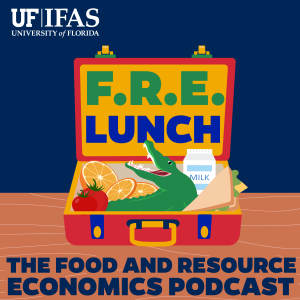In 2023, the average person in the United States consumed about 57.6 pounds of beef. Although that number is projected to decrease slightly in 2024, beef remains a major part of the American diet and the American economy.
However, like many other agricultural industries, the beef cattle industry is at risk of what could be devastating impacts should a cattle disease outbreak impact production. Many protective measures are in place to prevent the impact of a cattle disease outbreak on production and consumers.
This month’s episode of F.R.E. Lunch: The Food and Resource Economics Podcast explores the potential threats posed by a zoonotic disease outbreak to the U.S. Cattle Industry and provides a unique look into the undergraduate research opportunities available to UF/IFAS CAL students looking to complete an honors thesis project.
In this episode, Shelby Sumner, a Spring 2024 alumnus of the Food and Resource Economics Program and current graduate student at Oklahoma State University, joins us. For her undergraduate honors research thesis, Sumner chose to focus on addressing an issue close to home.
“I am originally from Okeechobee, Florida, which is a huge cow town. We are number one in the state for head of cattle and number 11 in the country,” Sumner said. “While my family doesn’t ranch, I grew up spending a lot of time on ranches.”
The study, conducted by Sumner with guidance from undergraduate honors research coordinator Caleb Stair, looked at some of the zoonotic diseases most likely to pose a threat to US cattle: bovine spongiform encephalopathy, more commonly known as mad cow disease, foot and mouth disease, and brucellosis, as well as some diseases transmitted by wildlife and ticks.
As Sumner explains, the concern surrounding a disease outbreak among Florida cattle is particularly nuanced based upon the fact that Florida is a cow-calf state.
“Florida is a cow-calf state, so we don’t usually raise beef cattle up to market weight,” Sumner said. “We send them out west where they can put on weight a little bit easier. So, if there was a disease outbreak, we’d be a little stuck here because we’d have nowhere to send them.”
Want to Learn More?

To learn more about the research project, Sumner’s experiences with the Florida Cattle Industry, and the process of completing an undergraduate honors thesis, listen to the latest episode of F.R.E. Lunch
Tune in here: https://fred.ifas.ufl.edu/fre-lunch-podcast
F.R.E. Lunch is the official podcast of the UF/IFAS Food and Resource Economics Department, showcasing how economics can help us understand and address the complex issues facing agricultural and natural resource industries. Each month, a short 15—to 20-minute episode features FRE faculty and student research presented in a bite-sized, easily digestible format that will surely bring you back for seconds.
 3
3
